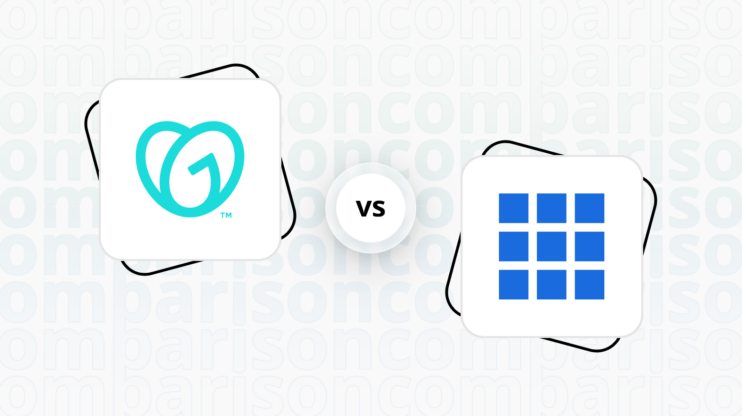GoDaddy vs Google Sites: Final verdict
GoDaddy and Google Sites both offer unique strengths, but they cater to different user needs and preferences.
GoDaddy (Overall Grade: 7.5/10)
is a comprehensive platform that excels in providing a wide range of services, including domain registration, web hosting, and a user-friendly website builder. It is particularly strong in ecommerce capabilities, offering integrated payment processing, flexible shipping options, and detailed reports. When comparing GoDaddy vs Google Sites, GoDaddy is ideal for users seeking a versatile and feature-rich platform for building and managing their online presence.
Google Sites (Overall Grade: 5.6/10)
, on the other hand, is designed for simplicity and collaboration. It integrates seamlessly with other Google services, making it a great choice for team projects, personal portfolios, and small business websites. Considering GoDaddy vs Google Sites, Google Sites offers a straightforward, user-friendly interface and is perfect for users who prioritize ease of use and collaboration over advanced features.

|

|
|
|---|---|---|
Design functionalities & templates |
8.0 |
4.9 |
Ease of use |
8.2 |
8.3 |
Ecommerce |
7.2 |
1.8 |
Website editors |
6.7 |
7.0 |
Product testing options |
8.1 |
6.9 |
Price |
7.9 |
8.1 |
Hosting quality |
7.8 |
8.2 |
Website speed optimization |
7.6 |
3.3 |
Plugins/extensions and integrations |
7.3 |
6.4 |
Marketing features |
7.3 |
2.6 |
Customer support |
8.5 |
7.2 |
Website security |
6.8 |
9.3 |
AI capabilities |
7.5 |
0 |
User management |
7.3 |
7.8 |
Which one is the best for ecommerce: GoDaddy or Google Sites?
 7.2
7.2
 1.8
1.8
Verdict
: GoDaddy is a more suitable choice for ecommerce due to its integrated features and tools, while Google Sites falls short in this area, relying heavily on third-party integrations.
GoDaddy
: GoDaddy provides a robust set of ecommerce features, including payment processing, flexible shipping options, and tools for product and order management. It also offers around 70-80 ecommerce themes, basic customization options, and detailed reports. This makes GoDaddy a more comprehensive solution for businesses looking to establish an online store.
Google Sites
: Google Sites does not have built-in ecommerce features and relies on external integrations for ecommerce functionalities. While it is a good tool for creating simple websites and integrating Google services, it is not ideal for businesses looking to manage an online store directly on the platform.
Which one is the best for informational and business websites?
 7.9
7.9
 7.2
7.2
Verdict
: When it comes to creating informational and business websites, GoDaddy and Google Sites each have their own strengths. GoDaddy scores higher overall, making it a more versatile choice for a wide range of business needs, while Google Sites excels in ease of use and integration with other Google services.
GoDaddy
: GoDaddy is a comprehensive platform that offers a wide array of services, including domain registration, web hosting, and a user-friendly website builder. It provides over 1500 templates catering to various industries, making it a versatile choice for business websites. With a score of 7.9, GoDaddy stands out for its extensive design functionalities and robust customer support, making it suitable for businesses looking for a more feature-rich platform.
Google Sites
: Google Sites is designed for simplicity and ease of use, making it an excellent choice for users who need to create basic informational websites quickly. With seamless integration with other Google services, it is particularly useful for team projects and small business websites. Although it scores slightly lower at 7.2, Google Sites offers a user-friendly interface and strong security features, making it a reliable option for straightforward website needs.
GoDaddy vs Google Sites: Detailed comparison
Design functionalities & templates
Design FunctionalitiesRepresents how well each platform allows for creative design and customization of websites.Score Components:
- Template Variety (30%): Range and quality of design templates.
- Customization (30%): Flexibility and options for design alterations.
- User Interface (20%): Ease and intuitiveness of the design process.
- Responsiveness (10%): Adaptability to different devices and screen sizes.
- Innovation (10%): Unique design features and tools.
 8.0
8.0
 4.9
4.9
🏆
Winner: GoDaddy.
If you’re looking for a platform that offers more creative control, a wide array of design features, and a larger variety of templates, GoDaddy is the preferred choice.
GoDaddy provides an extensive collection of over 1500 website templates catering to diverse industries and design preferences. These templates cover business, ecommerce, creative, personal, and non-profit sectors, offering various styles such as modern, classic, bold, minimalist, and content-focused. With customization options, mobile responsiveness, and a combination of free and premium templates, GoDaddy aims to meet the needs of users seeking versatile and visually appealing website designs.
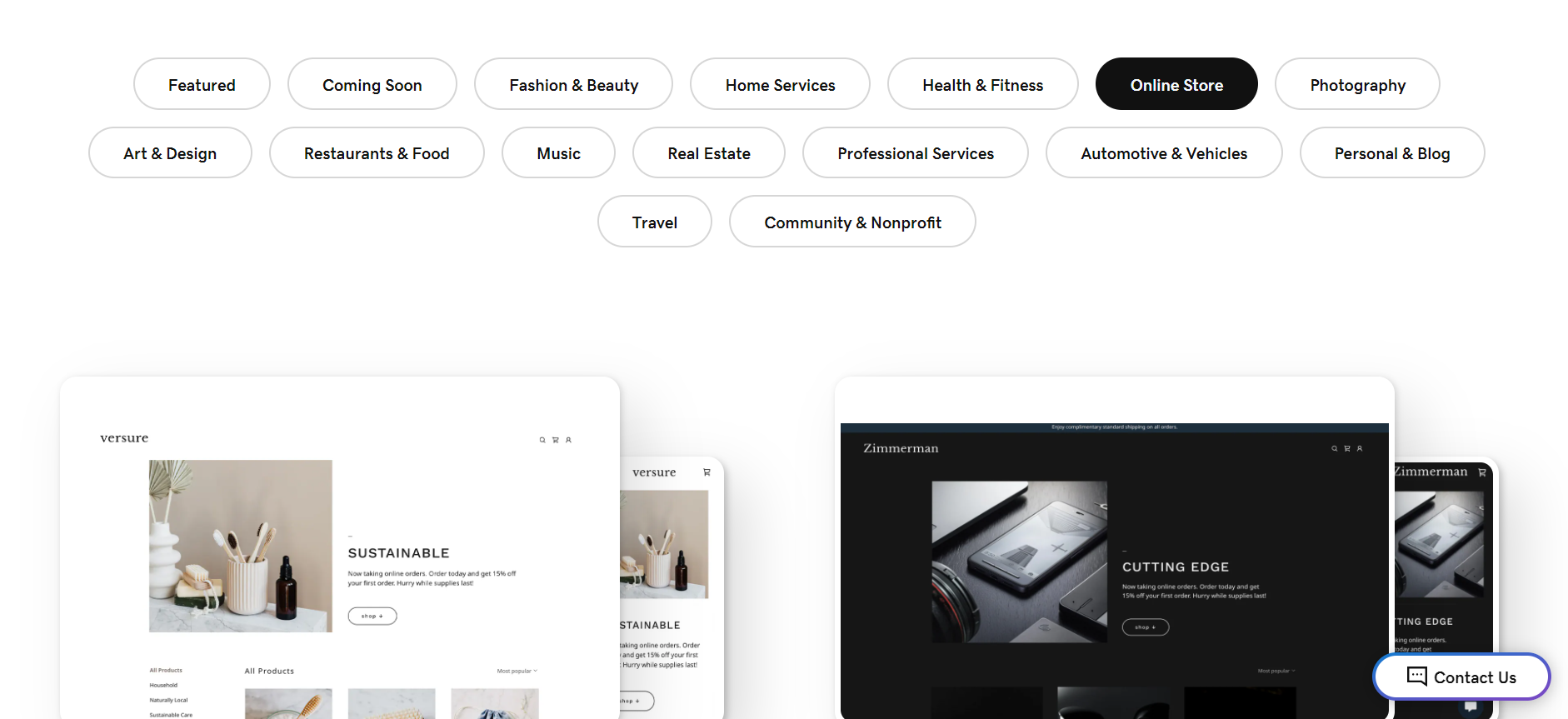

Compared to GoDaddy, Google Sites offers a limited number of templates suitable for various purposes, from personal blogs to business websites, with both free and premium options available.
These templates are designed for user engagement, simplicity, and functionality, allowing for customization to meet specific needs. However, compared to other website builders like 10Web or Squarespace, Google Sites might offer less variety in templates and design customization options.
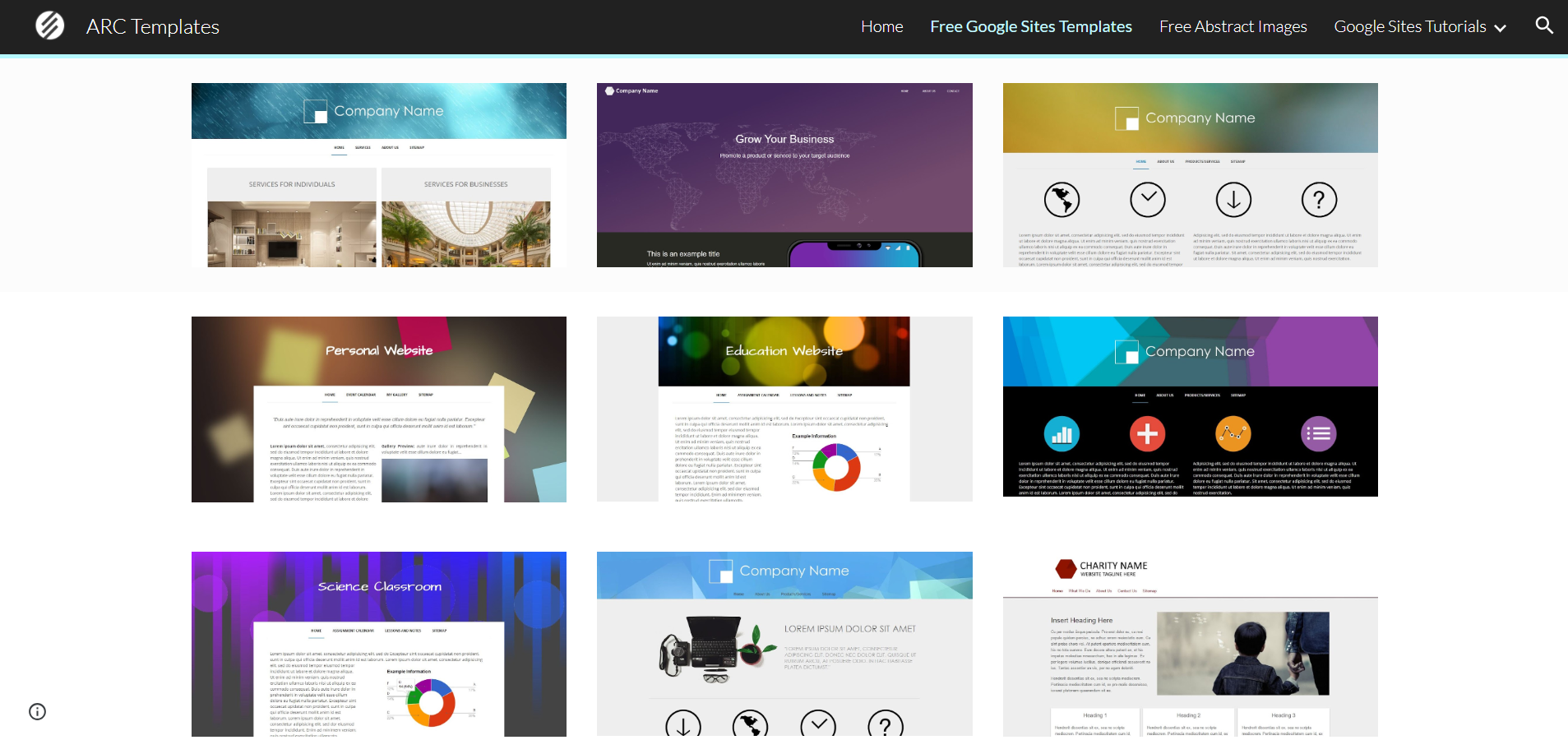

Get a head start on website creation with AI
Create a custom website tailored to your business needs 10X faster with 10Web AI Website Builder!
Ease of use
Ease of useReflects the platform’s overall user-friendliness.Score
Components:
- Learning curve (40%): Quickness and ease of getting started.
- Interface design (30%): Simplicity and intuitiveness of layout.
- User guidance (20%): Quality of tutorials and support.
- Flexibility (10%): Adaptability to various user skills.
 8.2
8.2
 8.3
8.3
🏆 Winner: Google Sites
. With a score of 8.3, Google Sites slightly edges out GoDaddy, which scored 8.2. Google Sites’ user-friendly interface and seamless integration with other Google services make it a straightforward tool for creating basic websites. GoDaddy, while also user-friendly, offers a more comprehensive range of services, which may present a steeper learning curve for beginners.
Learning Resources
🏆 Winner: Google Sites
. Google Sites offers a wide array of learning resources, from practical guides for educators to comprehensive digital skill development programs. GoDaddy also offers a range of learning resources, but these are more tailored to different services and may not be as comprehensive as those offered by Google Sites.
For ecommerce
EcommerceMeasures the platform’s effectiveness in supporting online business activities.Score Components:
- Ecommerce themes and templates (20%): Variety and design of templates.
- Product management (25%): Ease of managing and organizing products.
- Payment options (25%): Variety and convenience of payment methods.
- Ecommerce features (20%): Features for managing an ecommerce store.
- Integration (10%): Compatibility with external e-commerce tools and services.
 7.2
7.2
 1.8
1.8
GoDaddy and Google Sites offer different levels of ecommerce capabilities. GoDaddy provides a comprehensive set of ecommerce features, including integrated payment processing, flexible shipping options, and tools for product and order management. Google Sites, on the other hand, does not have built-in ecommerce features and relies on third-party integrations for ecommerce functionalities.
 |
 |
|
|---|---|---|
Ecommerce themes and templates |
6.5 |
0.0 |
Product page customization |
6.0 |
0.0 |
Payment processing and commissions |
7.5 |
1.0 |
POS capabilities |
6.0 |
0.0 |
Payment gateways |
7.0 |
2.0 |
Product numbers |
7.0 |
0.0 |
Additional ecommerce features |
6.5 |
0.5 |
GoDaddy ecommerce features:
- Payment processing
- Shipping options
- SEO tools
- Email marketing features
- Social media integrations
- Detailed reports
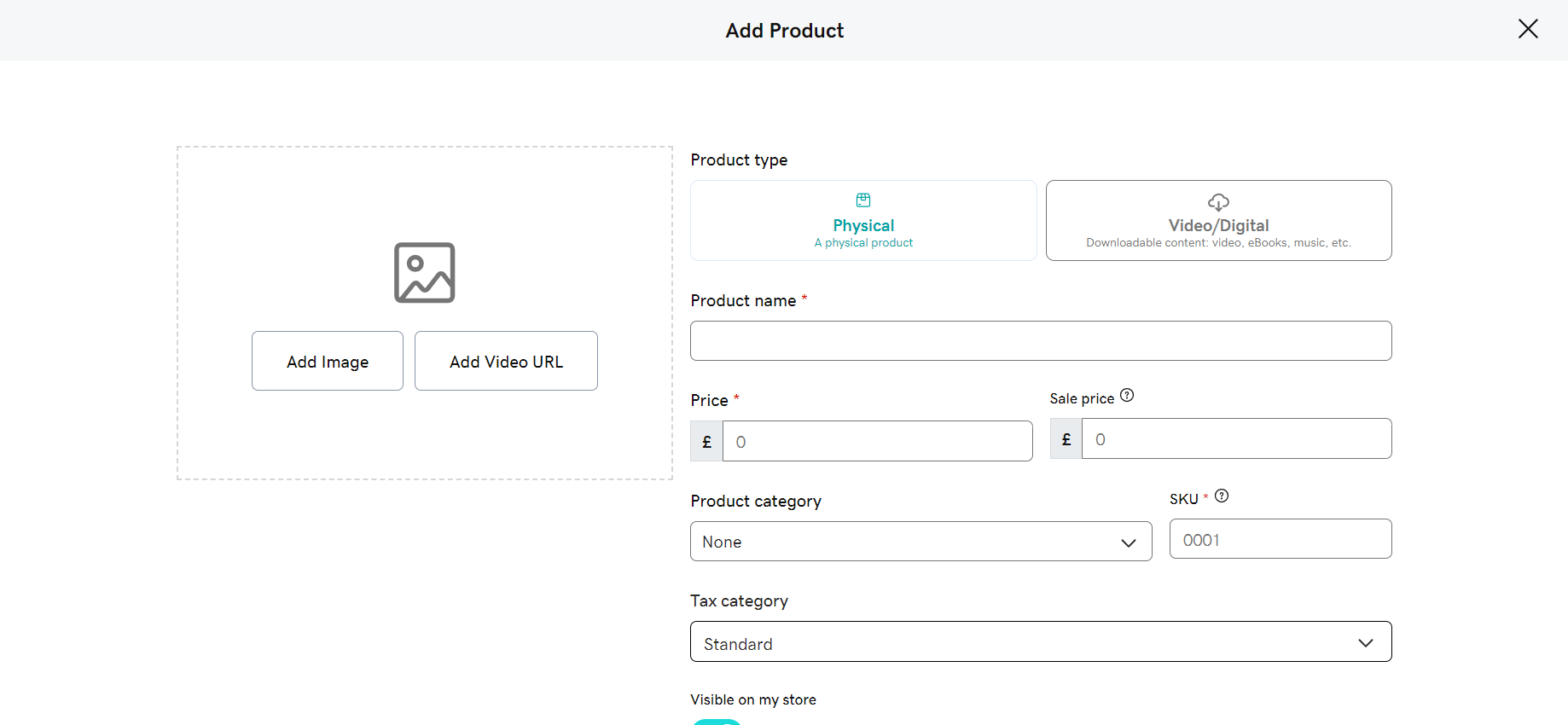
Google Sites ecommerce features:
Google Sites itself does not have built-in eCommerce features. To have a full-fledged eCommerce platform with Google Sites, you’d need to rely on external integrations or services.
Ecommerce themes & templates
GoDaddy offers around 70-80 ecommerce themes that cover diverse industries and styles. These themes are generally mobile-friendly with basic customization options. However, extensive design changes might require coding knowledge within the builder’s framework. Google Sites, on the other hand, does not offer any ecommerce templates.
Product page customization
GoDaddy’s ecommerce platform offers basic customization options like editing content, adding images, and adjusting layouts. For advanced customization, coding knowledge is required. Additional features include managing product variations, organizing information with tabs, and implementing discount codes and promotions directly on the page.
Google Sites lacks any product page customization features, as the products can be listed with embedding third-party platforms, all the customization can be done within the mentioned platforms.
Payment processing
GoDaddy Payments provides a versatile solution for online, in-person, and phone payments with a tiered pricing structure. Generally, online transactions have the lowest fees (2.3% + 30¢), while in-person and manually entered transactions have slightly higher rates (2.3% + 0¢). GoDaddy Payments offers simplicity, but users requiring specific integrations with shopping carts or CRM systems may find limited support.
On the other hand, Google Sites does not offer native payment processing features. Instead, it relies on external tools or links for integrating payment gateways. This can be done by embedding HTML code for payment buttons from services like PayPal, Square, or Stripe, or by linking to an external checkout page. However, Google Sites doesn’t offer the comprehensive eCommerce capabilities that dedicated platforms provide.
Website Editors
Website EditorsEvaluates the platforms’ website building and editing capabilities.Score Components:
- Customization tools (40%): Range and power of editing features.
- Editor usability (30%): User experience within the editor.
- Design flexibility (20%): Freedom in layout and design changes.
- Update and maintenance ease (10%): Simplicity of updating and maintaining the site.
 6.7
6.7
 7.0
7.0
🏆
Winner: Google Sites
. Google Sites, with a score of 7.0, offers a user-friendly website builder editor that allows users to create and design websites without needing coding knowledge. With its drag-and-drop interface, users can easily add, customize, and arrange elements such as text, images, and videos on their web pages. It also provides a variety of templates and design options to help users get started quickly and ensure their site looks professional.
Additionally, Google Sites integrates seamlessly with other Google services, enabling the incorporation of Google Docs, Sheets, Slides, and Maps directly into the website.
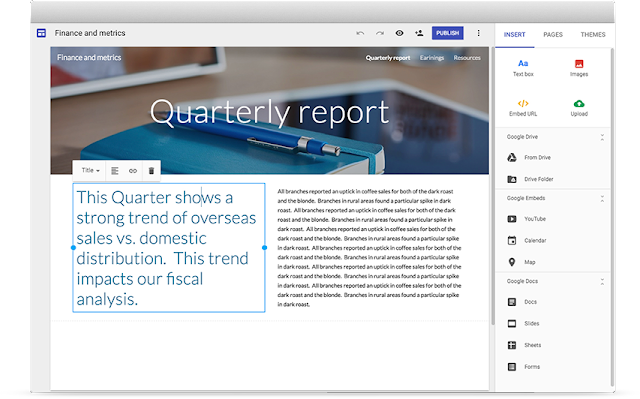
GoDaddy’s editor, scoring 6.7, is a user-friendly drag-and-drop tool enabling website creation without coding. It offers pre-designed templates, a mobile-friendly interface, basic SEO tools, and ecommerce integration, making it accessible for beginners, with affordable pricing plans and an all-in-one solution.
However, it has some design limitations, basic features compared to dedicated platforms, a learning curve for extensive use, and potentially limited third-party app integrations.
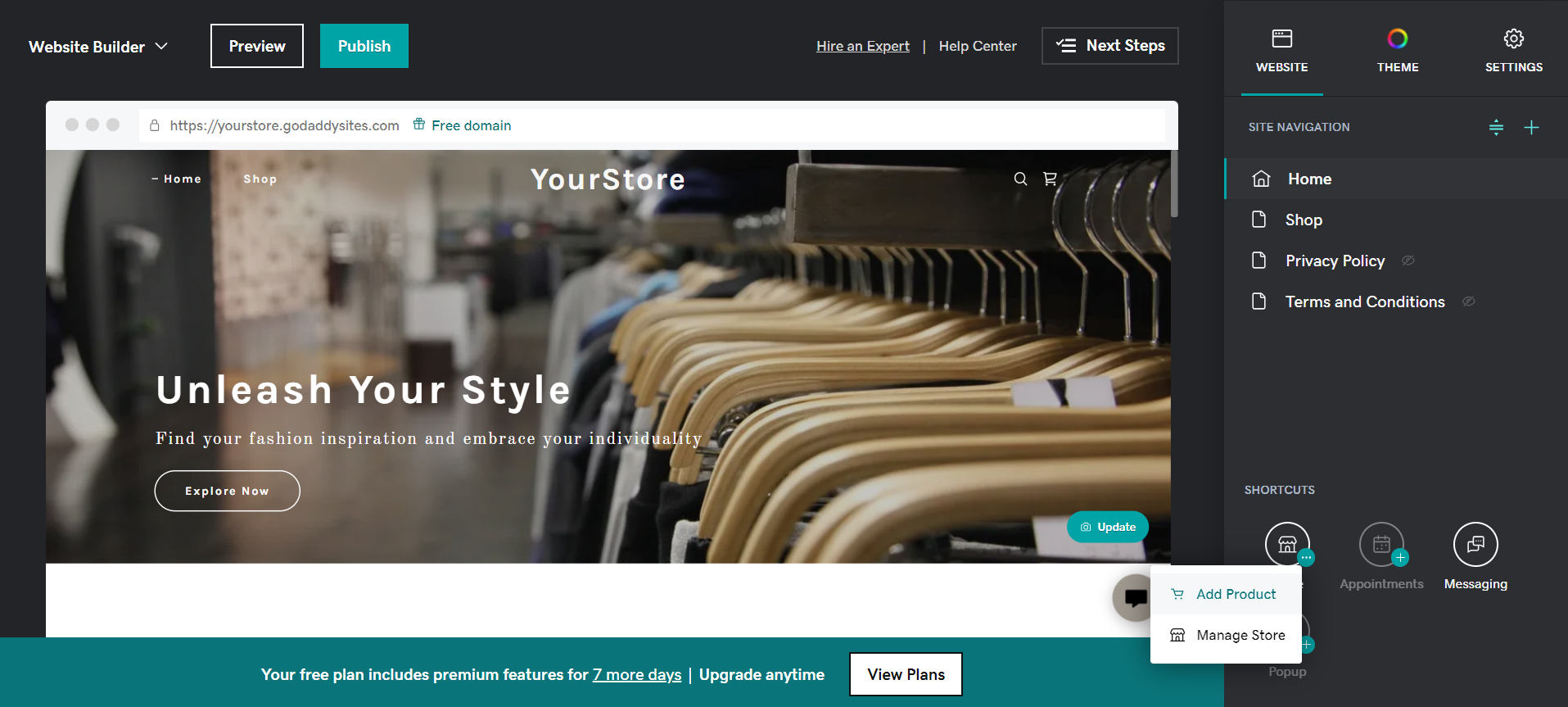
Mobile editor/app
 5.5
5.5
 0
0
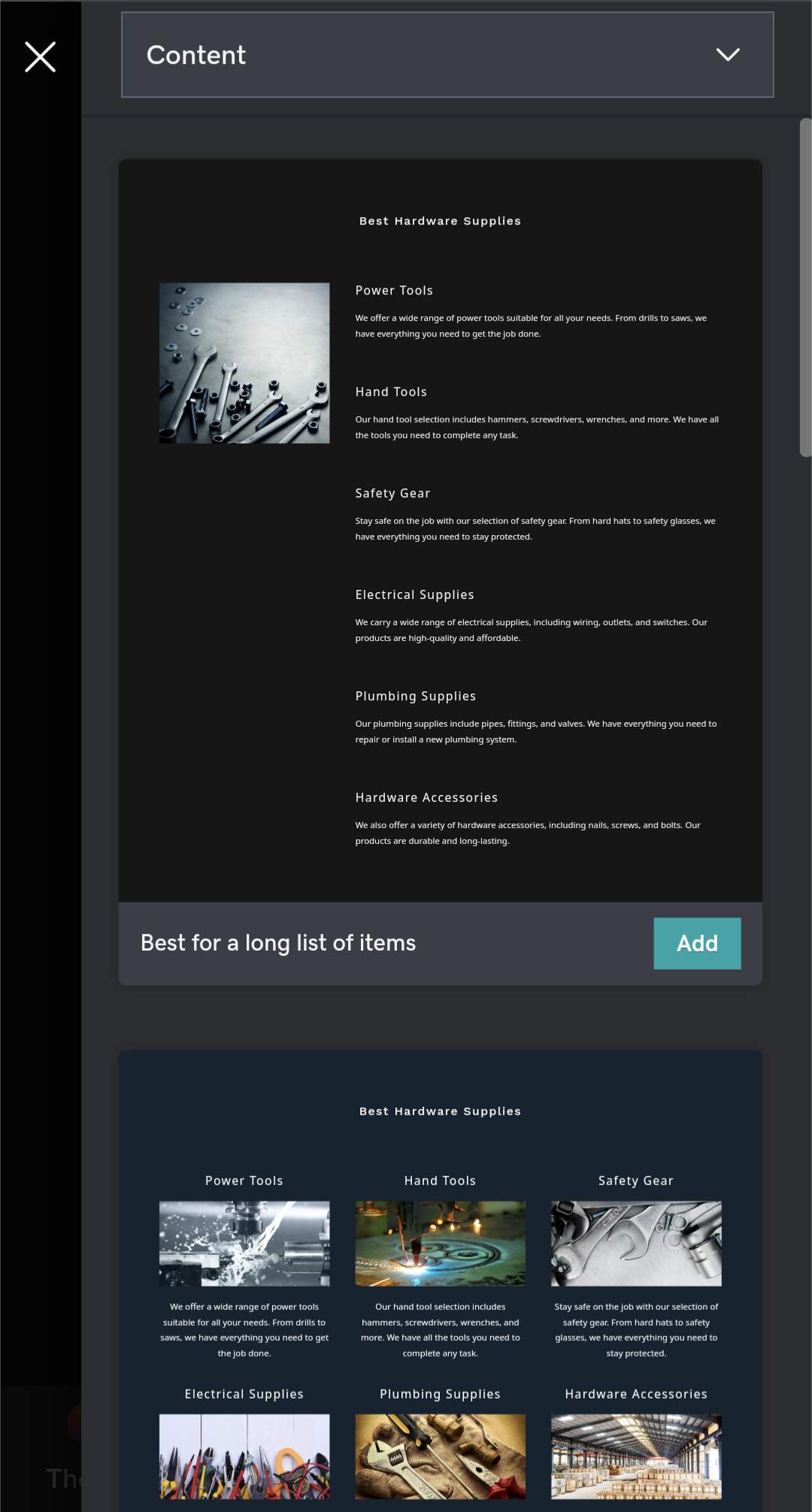
🏆
Winner: GoDaddy
. Neither GoDaddy nor Google Sites offer a dedicated mobile app for editing websites. However, GoDaddy allows users to log into their account and access the website builder through a mobile web browser. This provides some level of flexibility for users who need to make quick changes or updates on the go.
On the other hand, Google Sites does not have a mobile editor, limiting its accessibility and convenience for users who prefer to work on their websites from a mobile device.
Therefore, GoDaddy comes out ahead in this category due to its ability to provide a mobile editing experience, albeit through a web browser.
Product testing options
Product Testing OptionsAssesses the options for trying out platform features before commitment.Score Components:
- Trial quality (40%): Extent and usefulness of the trial or free version.
- Feature accessibility (30%): How many features are available to test.
- Trial duration (20%): Length of the trial period.
- Ease of transition (10%): Smoothness of moving from trial to paid plans.
 8.1
8.1
 6.9
6.9
Overall Result
:
GoDaddy Wins
. GoDaddy scores 8.1 in product testing options, offering a free version, no trial version but a 30-day money-back guarantee, and the possibility to test all premium features within the refund window. Google Sites, scoring 6.9, also provides a free version and a 14-day trial version, but it only allows testing of some premium features and does not offer a money-back guarantee.
 |
 |
|
|---|---|---|
Free Plan |
Yes | Yes |
Trial Duration |
No (30-day money-back guarantee) | 14 days |
Testing Premium Features |
All features within refund window |
Limited within trial period |
Money Back Guarantee |
30 days | No |
Price
PriceLooks at the cost-effectiveness and value for money of each platform.Score Components:
- Plan value (40%): What each pricing tier offers.
- Transparency and clarity (30%): Clearness of pricing structures.
- Flexibility of plans (20%): Range of options to suit different budgets.
- Hidden costs (10%): Additional expenses not included in the plan.
 7.9
7.9
 8.1
8.1
GoDaddy and Google Sites both offer a range of pricing options to cater to different needs, but Google Sites scores slightly higher in terms of price.

|

|
|
|---|---|---|
Free |
Free ($0/month): Build a basic website with limited templates, storage, and features. Ideal for testing the platform. |
No offering at this amount. |
$0-$8 |
Basic ($5.99/month): More templates, custom domain support, email marketing, SEO tools, social media integrations, analytics. Ideal for personal websites and small businesses. Value for price: 6.5 |
Business Starter ($7.20/month): This plan includes basic features suitable for individuals or small businesses, offering professional email through Gmail, 30GB of storage per user, and video meetings for up to 100 participants. It allows to manage 1 website and there is no limitation on number of pages. Value for price: 6.0 |
$8-$10 |
Premium ($9.99/month): All Basic features + blog, ecommerce with product listings and payments, advanced marketing tools, and analytics. Ideal for businesses with online sales or growing web presence. Value for price: 8.0 |
No offering at this amount. |
$10-$18 |
Commerce ($15.99/month): All Premium features + advanced ecommerce tools like cart recovery, discounts, reviews, memberships, and unlimited products. Ideal for businesses with significant online sales and complex product offerings. Value for price: 9.0 |
Business Standard ($14.40/month): Suitable for growing businesses, this plan provides 2 TB of storage per user, video meeting capacity for up to 150 participants with recording features, and access to smart booking pages and shared drives. It allows to manage 1 website and there is no limitation on number of pages. Value for price: 7.5 |
$18+ |
Pro ($19.99/month): All Commerce features + priority support, higher bandwidth, website security, and CDN. Ideal for businesses with high traffic and critical online presence. Value for price: 9.5 |
Business Plus ($21.60/month): Designed for larger businesses needing more robust capabilities, offering 5 TB of storage per user, advanced security options, and video meetings for up to 500 participants. It allows to manage 1 website and there is no limitation on number of pages. Value for Price: 8.5 |
location. As a result in rare cases the prices displayed here can differ from the ones you see on their
websites.
Hosting quality
Hosting
qualityExamines the reliability and performance of the hosting solutions.Score Components:
- Uptime (40%): Consistency and reliability of website availability.
- Speed (30%): Loading times and performance.
- Bandwidth and storage (20%): Sufficiency of resources provided.
- Data centers (10%): Quality and distribution of hosting infrastructure.
 7.8
7.8
 8.2
8.2
🏆
Winner: Google Sites
Google Sites edges out GoDaddy with its cloud-based managed hosting, offering basic storage with 100MB free per site, which can be increased by upgrading to Google Workspace. GoDaddy, on the other hand, offers a range of hosting types, but storage on certain plans is subject to inode limitations. Both platforms offer a 99.9% uptime guarantee, but Google Sites’ integration with Google Drive for backup functionalities gives it a slight advantage.
 |
 |
|
|---|---|---|
Do they offer hosting? |
Yes, included in all of their plans |
Yes, basic storage with 100MB free per site, can be increased by upgrading to Google Workspace |
Data Centers: |
Data Centers in USA, France, Germany and UK Cloud Services Through AWS |
Google operates a total of 21 data centers across the globe: 2 in Asia, 5 in Europe, 13 in US and 1 in South America |
Type of hosting: |
Shared Hosting, VPS Hosting, Dedicated, WordPress Hosting |
Cloud based managed hosting |
Uptime: |
99.9% |
99.9% |
Uptime Guarantee: |
Yes, 99.9% |
Yes, 99.9% |
Website Speed Optimization
Website Speed OptimizationEvaluates optimization of website loading timesScore Components:
- PageSpeed Score (30%): Google’s score indicating performance optimization.
- Loading Time (30%): The average time until a website is fully interactive.
- Mobile Optimization (15%): Optimization effectiveness for mobile devices.
- Resource Optimization (15%): Optimizing images, scripts, and other heavy resources.
- CDN Usage (10%): Use of CDN to enhance speed across geolocations.
 7.6
7.6
 3.3
3.3
🏆 Winner: GoDaddy
Both GoDaddy and Google Sites have strategies for website speed optimization, but GoDaddy’s comprehensive approach and disclosed statistics give it an edge over Google Sites.
 |
 |
|
|---|---|---|
Focus |
CDN, Automatic Maintenance, Resource Optimization |
Automated Optimization, CDN, Mobile Optimization, Browser Caching, Code Minification, Use of AMP |
Performance Tools |
Not specified |
Not specified |
Key Strategies |
CDN, Automatic Maintenance, Resource Optimization |
Automated Optimization, CDN, Mobile Optimization, Browser Caching, Code Minification, Use of AMP |
Load Times |
Shared Hosting: 2-4 seconds, VPS Hosting: 1-2 seconds, Dedicated Server: 0.5-1.5 seconds |
Not disclosed by Google |
Page Speed Scores Range |
Shared Hosting: 50-70/100, VPS Hosting: 70-85/100, Dedicated Server: 80-95/100 |
Not disclosed by Google |
Core Web Vitals Improvement |
Infrastructure upgrades, improved server infrastructure and data centers, effective caching mechanisms, image optimization tools, automatic minification of code files, optimized templates and code structures for efficient rendering |
Emphasis on LCP, FID, CLS improvements |
GoDaddy has a comprehensive approach to website speed optimization, including the use of a Content Delivery Network (CDN), automatic maintenance, and resource optimization. It has enhanced its platform through infrastructure upgrades, including improved server infrastructure and data centers, resulting in faster loading times.
Additionally, the implementation of effective caching mechanisms, image optimization tools, and automatic minification of code files contribute to a smoother user experience and improved Core Web Vital metrics. The website builder features optimized templates and code structures for efficient rendering, further enhancing overall performance.
Google Sites, on the other hand, focuses on automated optimization, the use of a CDN, mobile optimization, browser caching, code minification, and the use of Accelerated Mobile Pages (AMP). However, Google does not disclose statistics about website Page Speed scores or load times, making it difficult to assess the effectiveness of these strategies.
Google Sites places an emphasis on improving the Largest Contentful Paint (LCP), First Input Delay (FID), and Cumulative Layout Shift (CLS) metrics, which are key components of the Core Web Vitals.
Get a head start on website creation with AI
Create a custom website tailored to your business needs 10X faster with 10Web AI Website Builder!
Plugins and integrations
Plugins and integrationsMeasures the range and effectiveness of additional plugins and integrations.Score Components:
- Variety of options (40%): Range of available add-ons.
- Integration smoothness (30%): Ease of integrating plugins into the site.
- Quality of plugins (20%): Functionality and reliability of the options.
- Custom integration capabilities (10%): Support for custom or third-party integrations.
 7.3
7.3
 6.4
6.4
🏆 Winner: GoDaddy.
With a score of 7.3, GoDaddy offers a more comprehensive set of plugins and integrations, especially for users of its Managed WordPress Hosting. Google Sites, scoring 6.4, also provides a wide array of plugins and extensions, but GoDaddy’s versatility and access to the vast WordPress plugin repository give it an edge.
However, Google Sites might be a better choice for users who prefer a more straightforward approach to website building, as it offers easy-to-use, customizable widgets that require no coding knowledge.

Marketing Features
Design FunctionalitiesRepresents how well each platform allows for creative design and customization of websites.Score Components:
- Template Variety (30%): Range and quality of design templates.
- Customization (30%): Flexibility and options for design alterations.
- User Interface (20%): Ease and intuitiveness of the design process.
- Responsiveness (10%): Adaptability to different devices and screen sizes.
- Innovation (10%): Unique design features and tools.
 7.3
7.3
 2.6
2.6
🏆
Overall Winner: GoDaddy
. GoDaddy offers a comprehensive set of marketing tools, including SEO tools, email marketing, blogging, social media integration, analytics and reporting, and ads and promotions. Google Sites, on the other hand, offers basic SEO settings, social media integration, and Google Analytics integration, but lacks email marketing, blogging, and ads and promotions features.
 |
 |
|
|---|---|---|
SEO Tools |
Basic SEO settings |
|
Email Marketing |
||
Blogging |
||
Social Media Integration |
Tools for social media linking and content sharing |
Basic social media integration |
Analytics and Reporting |
Basic analytics with more detailed insights on higher plans |
Google Analytics integration |
Ads and Promotions |
Features to create and track online ads, including Google Ads |
Customer Support
Customer supportEvaluates the quality and availability of support options.Score Components:
- Response time (40%): Speed of support responses.
- Support quality (30%): Effectiveness and helpfulness of the support.
- Availability (20%): Range of support channels (phone, chat, email).
- Resource richness (10%): Quality of self-help and educational materials.
 8.5
8.5
 7.2
7.2
🏆 Winner: GoDaddy
. In the comparison of GoDaddy vs Google Sites, GoDaddy takes the lead with a customer support score of 8.5. GoDaddy offers 24/7 phone support in multiple languages, live chat, and email assistance, ensuring users can get help whenever they need it. Additionally, the 24/7 Community Forum and social media support provide further avenues for assistance, making it a robust support system for users globally.
Google Sites, with a customer support score of 7.2, primarily relies on self-service resources like a Help Center and community forums. Direct support, including phone, email, and live chat, is available to Google Workspace customers, with the level of support varying by subscription tier. While Google Sites offers 24/7 support for critical issues to eligible customers, the overall support experience is less comprehensive compared to GoDaddy, especially for free users who have limited access to direct support options.
Security
SecurityLooks at the platforms’ security measures and data protection.Score Components:
- Data protection (40%): Safeguards for user and customer data.
- SSL and encryption (30%): Implementation of secure connections.
- Compliance (20%): Adherence to industry security standards.
- Regular updates (10%): Frequency of security updates and patches.
 6.8
6.8
 9.3
9.3
🏆
Winner: Google Sites
. Google Sites, part of the Google Workspace, offers robust security measures including SSL encryption, two-factor authentication, and automatic malware scanning. It adheres to international data protection regulations and provides a secure environment for website creators and visitors. Google’s infrastructure also offers DDoS protection and data redundancy, ensuring site accessibility under heavy traffic.
GoDaddy, while offering a range of security features such as SSL certificates, malware scanning, and web application firewalls, falls short in comparison to Google Sites. Its focus on web hosting and domain registration leaves some gaps in comprehensive data security, especially in compliance with regulations like HIPAA or GDPR.
AI Capabilities
AI capabilitiesMeasures the effectiveness of AI-driven features and tools.Score Components:
- Automation efficiency (40%): Impact of AI on streamlining processes.
- Personalization (30%): AI-driven customization for users or customers.
- AI-Assisted design (20%): Role of AI in website design and functionality.
- Data analysis (10%): Use of AI in interpreting user data and analytics.
 7.5
7.5
 0
0
 |
 |
|
|---|---|---|
AI Builder |
||
AI Ecommerce features |
AI-generated product descriptions, customer service tool, and digital ad creation |
|
AI Content Generation |
AI-generated product descriptions, customer service messages, and social media ads |
|
Additional AI features |
🏆 Winner: GoDaddy
. GoDaddy, with a score of 7.5, utilizes AI mainly to enhance the ecommerce experience and content generation. Its AI features focus on generating product descriptions, customer service messages, and social media ads. These tools aim to save business owners time and effort, allowing them to focus more on growth.
Google Sites, on the other hand, does not have any AI capabilities. It scored 0 in this category. While Google Sites is a user-friendly platform for creating websites, it lacks the advanced AI features that can enhance the user experience and efficiency.
User Management
User ManagementAssesses the platforms’ capabilities in managing user roles, permissions, and accessibility.Score Components:
- Role Customization (40%): Flexibility in creating and defining user roles and
permissions. - Ease of Management (30%): User interface and tools for managing users.
- Access Control (20%): Effectiveness of access control measures for different user
levels. - Scalability (10%): Ability to manage a growing number of users efficiently.
 7.3
7.3
 7.8
7.8
🏆 Winner: Google Sites
. Both GoDaddy and Google Sites offer different approaches to user management.
- GoDaddy’s number of users who can edit a website varies based on the hosting plan and website building tool. For Website Builder (GoCentral and Websites + Marketing), the free plan permits one user, while Deluxe and Ultimate plans allow up to five users with full editing permissions. In WordPress Hosting, there’s default support for unlimited users, each with customizable permission levels controlled through the WordPress dashboard.
- Google Sites allows multiple users to collaborate with different roles, including Owners, who have full control, and Editors, who can modify content but not site settings. There’s no strict limit on the number of users who can edit a site, allowing flexibility in management and development. Viewers can only see the site, with no editing permissions. This structure supports collaborative website building with varied levels of access and control for different users.
GoDaddy User Roles and Access Levels:
| Role | Description | Access Highlights |
|---|---|---|
| Account Holder | The primary owner of the GoDaddy Website Builder account. | Full access to all website builder features, domain management, hosting settings, and account settings. |
| Delegate Access | Users granted permission by the account holder to access specific parts of the GoDaddy account. | Can be given varying levels of access, from managing domains and products to making purchases on behalf of the account holder. |
| Website Editor | Users with permissions to edit and update the website through the Website Builder interface. | Can customize the website, add or edit sections (e.g., image galleries, menus), and update content. |
| Online Store Manager | Specifically for websites with e-commerce capabilities, managing product listings, orders, and payments. | Access to manage the online store, including product listings, coupons, shopping cart, shipping, and payments. |
Google Sites does not provide a detailed user roles and access levels table. However, it is known that it supports multiple user roles including Owners, Editors, and Viewers with varying levels of control and access.
Additional Features
 |
 |
|
|---|---|---|
SSL Certificate |
||
Custom Domain |
||
Free Custom Domain Included |
||
International Domains |
||
Mobile Responsive |
||
Page Speed |
||
Website Builder Mobile App |
||
Convert a Website To An App |
||
Website Analytics |
||
Multilingual Sites |
||
Multiple Users |
GoDaddy vs Google Sites: User Feedback
Users generally praise GoDaddy for its affordability, reliability, and user-friendly interface, particularly in domain registration and hosting services. However, concerns include occasional interface changes, perceived slowness in website hosting, and dissatisfaction with pricing increases.
Users consistently praise Google Workspace, particularly Google Sites, for its seamless integration, ease of use, and collaborative features, making it a go-to solution for various professional and educational needs. The platform’s simplicity and user-friendly interface are lauded, enabling effortless website creation and sharing of information within organizations. While some users desire more customization options and additional features, overall, Google Workspace remains highly valued for its versatility and streamlined workflow facilitation.
The making of this blog
We followed a clear, step-by-step process to write and research this article.
GoDaddy vs Google Sites: FAQ
Which platform is better for ecommerce, GoDaddy or Google Sites?
Can I use both GoDaddy and Google Sites for creating informational or business websites?
How do GoDaddy and Google Sites compare in terms of ease of use?
What are the major differences in pricing between GoDaddy and Google Sites?
Which platform offers better customer support, GoDaddy or Google Sites?










